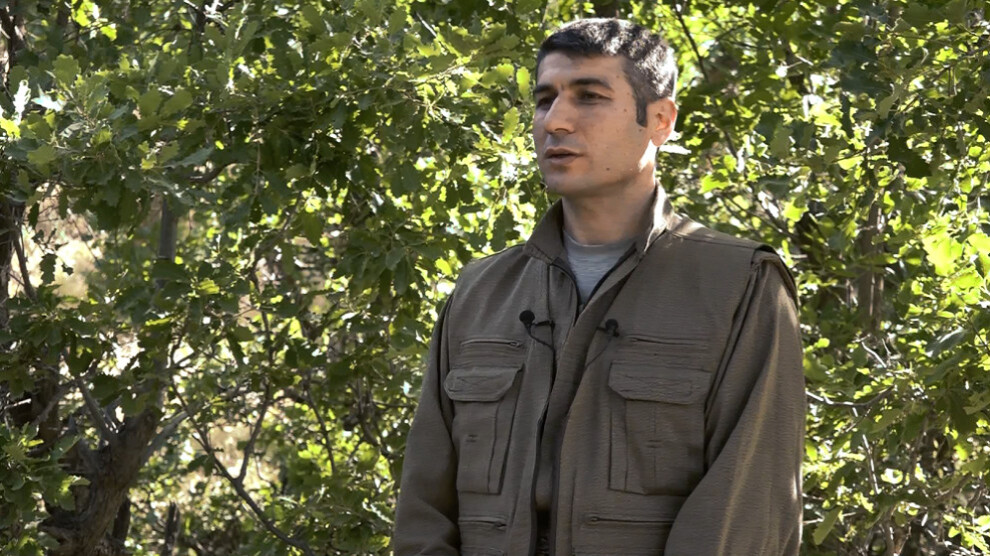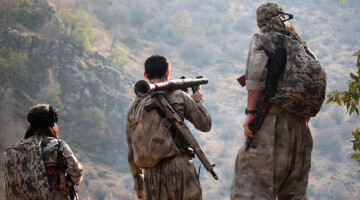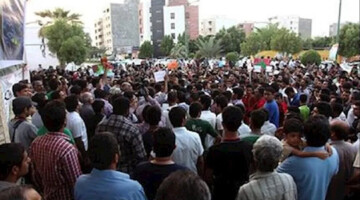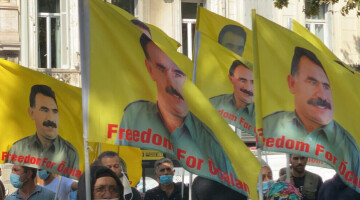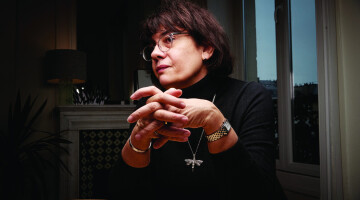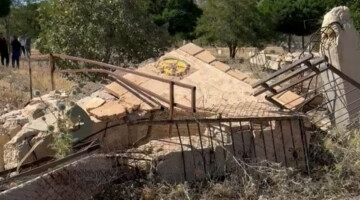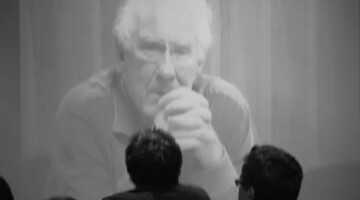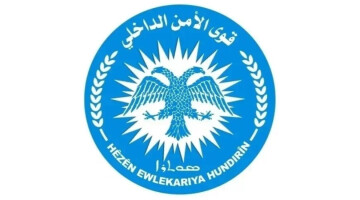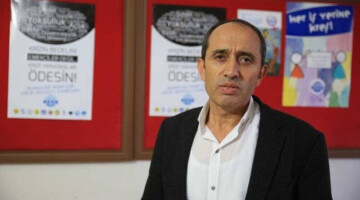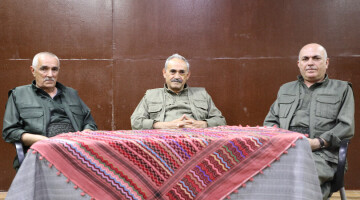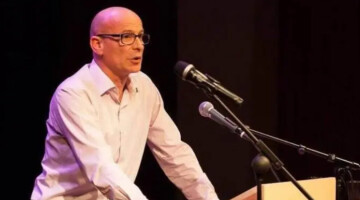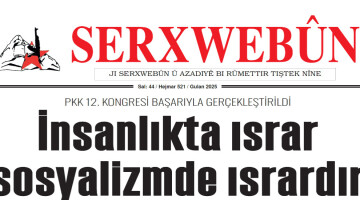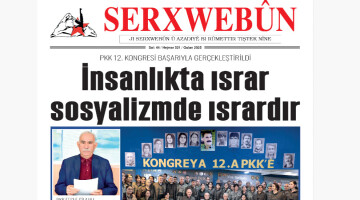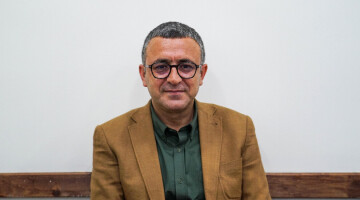There have been presidential and parliamentary elections in Turkey this year on May 14. Although a government was formed after the elections, it is not possible to speak of a system of government, since there is a total lack of democracy even within the minimum standards. After the transition to the so-called ‘presidential system of government in Turkey’, the Turkish parliament has basically no function anymore. All power accumulates in the hand of the designated president. Because of this characteristic, the opposition and large parts of society describe this system as a dictatorship and a one-man system. What has to be pointed out, is that the established system in Turkey has long been undemocratic. After the transition to the presidential government system, it has just moved even further away from democracy, and the character of the regime has become fascist. Turkey has now been ruled for nine years by the [the governing coalition] AKP-MHP, which follow a fascist ideology.
Turkish society is disturbed by the fascist, oppressive and exploitative character of this regime. This already leads the Kurdish people to engage in an uninterrupted struggle against it. In the elections of May 14, it can be seen that the people in Kurdistan did not give their votes to the AKP-MHP, as well as the Kurdish society that is living in the cities of Turkey also did not. The Kurdish people voted for the HDP [Peoples’ Democratic Party] together with the democratic part of Turkish society. This can be clearly seen by looking at the election results in Kurdistan, which definitely differ from the situation in Turkey. The AKP-MHP did not manage to get a stance in Kurdistan. But this situation is ignored within the unitary mentality of the nation-state system. However, it can be clearly stated that by not representing the political will of the Kurdish people the government of AKP-MHP has no legitimacy in Kurdistan. Not only in terms of the Turkish state, but also in terms of the international institutions in the world, not recognizing this matter of fact is extremely anti-democratic.
Erdoğan's re-election as President of Turkey is also a result of the situation in which the opposition currently finds itself in the country. The struggle we waged as a people and as a movement weakened the fascist AKP-MHP government. Despite being re-elected, this situation of the AKP – MHP government continues. As with all governments of the last decades in Turkey, the AKP-MHP coalition was brought to power by the state to liquidate our movement. However, despite all its attacks, it is unable to realize that by doing so it is weakening itself. Coming back to power does not change this fact. There is a mentality and system in Turkey based on the genocide of the Kurds, and the success of a government depends on how effectively they carry out this task. Of course, our struggle as a movement works towards the defeat of this fascist government, while they are trying to finalize the concept of liquidation and genocide. Today, the KCK system and politics have gone beyond the borders of Kurdistan. Developments in the political arena affect and shape Turkish society. Despite all the attacks under the policy of special warfare, and despite the nationalist, chauvinist and reactionary provocations, the power of an alliance of the democratic forces within Turkey has become essential. The political direction of this is defined as the so-called Third Way in Turkey. Nationalist, statist and fascist forces are extremely disturbed by this. As a matter of fact, the nationalist, religious, chauvinist forces formed around the AKP-MHP coalition in the elections and based their entire propaganda on weakening the idea of the Third Way led by the HDP and preventing its success. Through special warfare methods, the system-internal opposition has also been made to follow this policy and, ironically, has been made to serve the AKP-MHP. But despite this, the HDP has maintained its presence and political weight. Especially in Kurdistan, where the election results showed that the AKP-MHP had failed.
If the system-internal opposition in Turkey had broken with the official state ideology based on the Kurdish genocide, if it had a discourse and attitude that did not serve these policies, society in Turkey would not, in the majority, vote for the AKP-MHP and would prefer alternative politics. But since the opposition is not in such a situation, since it has the same discourse and politics as the government, Turkish society as a whole did not break away from the government. Because the AKP-MHP coalition uses the power and means of the state to present itself as a better option. This is the political and social picture in Turkey. The opposition is not ahead of the government, but next to it or even further behind it. In the elections of May 14, the system-internal opposition led by the CHP [Kemalist Republican Party] offered Turkish society a return to the parliamentary system. However, what Turkey needs and what society expects is not restoration, but change and democratization. However, the opposition does not have the mentality to present and defend this.
The main problem in Turkey is one of mentality. Unless the mentality changes, it is not possible to solve the problems. In the past, there used to be a parliamentary system in Turkey, but at that time there was a situation like the current one. Politics based on Kurdish genocide was being carried out then. Now there is a system called the presidential government system, but since the mentality is the same, the situation is the same as before. Therefore, there is no change in the system, apart from a formal one. In Turkey, formal changes are made according to the phase and these changes are mostly the result of military coups and similar interventions. When the concepts based on the Kurdish genocide collapse, temporary changes, formal changes are made in order to carry out a new concept, which leads to a more denialist, oppressive and reactionary situation. Just like today’s transition to the presidential government system. When it was realized that the politics based on Kurdish genocide could not be continued with traditional concepts and policies, a so-called systemic change was made and the current regime emerged. In other words, it has gone back even further.
After the elections of May 14, a new government cabinet was formed, but in fact the government has not changed. The system in Turkey has in fact abolished the system of government long ago. In the most general sense, governments are political teams that govern the state under the responsibility and supervision of representatives elected by the people. In this sense, they have a partial democratic content. A certain legal process is followed. But not even this is the case in Turkey. The state is governed allegedly at the disposal of an elected person. Whatever mentality this person represents and whatever forces he or she is allied with, the policy he or she pursues is based on this. Therefore, the government is also determined according to this policy. Its nature is not political but bureaucratic. The ruling AKP-MHP coalition is a fascist organization that defends the mentality of the ‘Committee of Union and Progress’ [Turkish nationalist organization active between 1889 and 1926; organized the Armenian Genocide in 1915] and is its modern-day version. Erdoğan is the main actor of this mentality and politics. As is known, the ‘Committee of Union and Progress’ was a racist and genocidal organization. It wanted to restructure the Ottoman Empire through Turkishness. It`s official ideology was Turanism, where the aim is to to create an area of sovereignty consisting of the Balkans, Anatolia, Arabia, Kurdistan, the Caucasus and Central Asia, starting from the south of Central Europe, including the regions on the northern shores of the Black Sea and the southern shores of the Mediterranean. These geographies were planned to be Turkified and ruled. First and foremost, a central area of pure race was to be created. For this purpose, genocide was committed against the Armenian people, taking advantage of the conditions of the First World War. This policy was also applied to other non-Muslim peoples. Muslim peoples with large populations, such as Arabs and Kurds, were intended to be Turkified through assimilation policies. But when the Arabs and Kurds opposed this policy, they too were subjected to massacres and genocide. It was for this purpose that the Unionists entered the First World War. In short, it had a genocidal and expansionist mentality and policy. These are known historical facts. I have mentioned them to show the foundations on which the AKP-MHP government rests, because the AKP-MHP government originates in this tradition and continues it.
Taking advantage of the current conjuncture, the AKP-MHP government wants to reach the borders of the so-called Misak-ı Millî [National Pact] and, based on this, establish hegemony over the Mediterranean, Arabia, the Caucasus and Central Asia. It already has a significant part of Kurdistan under its sovereignty, and it is constantly attacking places that are not directly under its sovereignty. This is not an abstract goal, but a policy in practice. The Turkish state and the ruling elites have expansionism in their character. In the bipolar world system that emerged after the Second World War, the Turkish state had to restrain its expansionist ambitions for a long time by joining the Western and NATO bloc, except for the occupation of Cyprus. Because the period did not allow for this. In this process, the Turkish state used all its weight to suppress the struggle of the Kurdish people and carry out a genocide against them. That is why Turkey became a member of NATO and carried out its genocidal policies with the support it received from the USA, Europe and NATO. It was able to carry out the struggle against our movement with the support it received from them. The international conspiracy against Rêber Apo [Abdullah Öcalan] was also supported by the US, Israel and NATO. This Western support continues today. If it were not for the support of the West, neither in the past nor today, the Turkish state would have been able to carry out its policies of genocide against the Kurds. This is an obvious reality.
After the dissolution of the bipolar world system, and especially closer to present times, the Turkish state has reactivated its expansionist policy. The foreign policy of the AKP-MHP government is based on this motivation. Historically, the politics of the Turkish state has been based on two dimensions. Domestically, to carry out genocide against the Kurds, and externally, to expand into targeted areas and establish sovereignty. The Turkish state sees the current time in the multipolar world system as an opportunity for this and wants to take advantage of it to achieve this goal. This is why the AKP-MHP coalition was formed and brought to power. Thus, by securing NATO’s support on the one hand and taking advantage of the power balances on the other, it aims, firstly, to finish the genocide against the Kurds by liquidating our movement, and secondly, to create an area of sovereignty against the outside world. In this direction, a violent attack and annihilation concept is being carried out against our movement and our people. In the same way, an attack and occupation concept is being carried out abroad. The intervention in the Eastern Mediterranean and Libya, the occupations in Syria and Rojava [Western Kurdistan/Northern Syria], the occupation attacks in Iraq, and the attitude of exerting influence over the Caucasus by driving Azerbaijan against Armenia are the practicalization of this policy. On the other hand, the Turkish state uses the millions of refugees in Turkey, mostly Syrians, as a threat against Europe. At the same time, so-called Salafist religious fascist gangs, especially IS and al-Nusra, are also recruiting new members from these masses of refugees. These gangs have already taken up positions in the areas occupied by the Turkish state in Rojava and Syria and have created reactionary, religious, fascist emirates there. However, this reality is tightly concealed and not put on the agenda. The main reason for this is the agreement on refugees made by the EU and European governments with the Turkish state. The Turkish state pressurizes Europe over the refugees and they keep silent about its policy. However, this policy of European governments is based on saving the day and is far from eliminating the danger. The policies pursued by the AKP-MHP government are based on a warlike structure and harm everyone. With these policies, the problems in the region are deepening and the region is being drawn into a war. Even though Europe also suffers from this, the West has unfortunately always taken a pragmatic approach and the Turkish state has taken advantage of this and carried out its own genocidal and expansionist policies.
Now some people are saying that the Turkish state has changed its policy with the new government formed after the elections of May 14. This is neither a correct nor a accurate statement. There is no change in the policy of the Turkish state. If there had been a change, the AKP-MHP government would not have been brought back to power. The equation can be set up as follows: As long as the AKP-MHP government is in power, politics in Turkey will not change. In order for politics to change in Turkey, this anti-Kurdish and expansionist fascist alliance must be dissolved. What is happening now are formal changes. Adding new names to the cabinet does not show that there is a change, in essence. In fact, when we look at the practice, it is clearly seen that the same attitude continues. The reason why some formal changes have been made is because of the difficulties experienced. The AKP-MHP government has been waging a war against our movement and our people for nine years. However, despite all these intense attacks, it has not been able to liquidate our movement and suppress the freedom struggle of our people. This situation has put the AKP-MHP government into a crisis. Since all the power, means and economy of the state have been spent on the war against the Kurdish people, a serious economic crisis has emerged. As a result, the state and the government are in a serious blockage and crisis. Although the lack of opposition in Turkey makes it easier for the government to manage this process, this is not enough to overcome the crisis. It is because of this difficulty, that the AKP-MHP government has adopted a policy that emphasizes more diplomacy. The aim is to get more political and economic support from foreign powers. Because it is not possible to carry out a policy based on Kurdish genocide without this. The new names in the government cabinet are meant to carry out such a policy. Beyond this, there is no change in the government’s policy.

